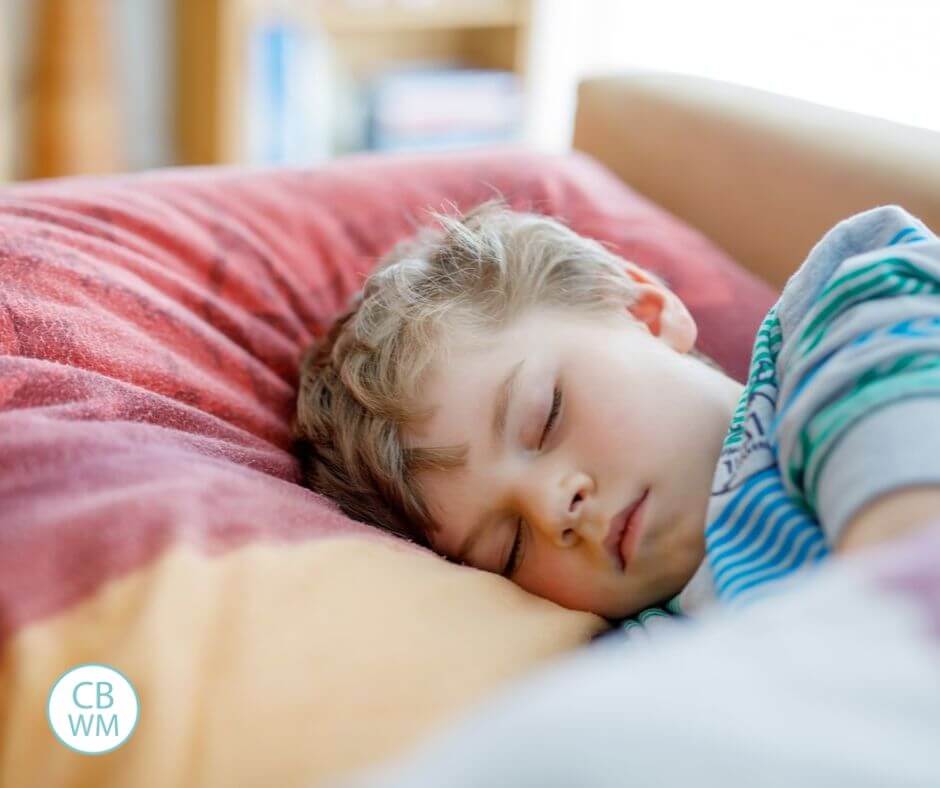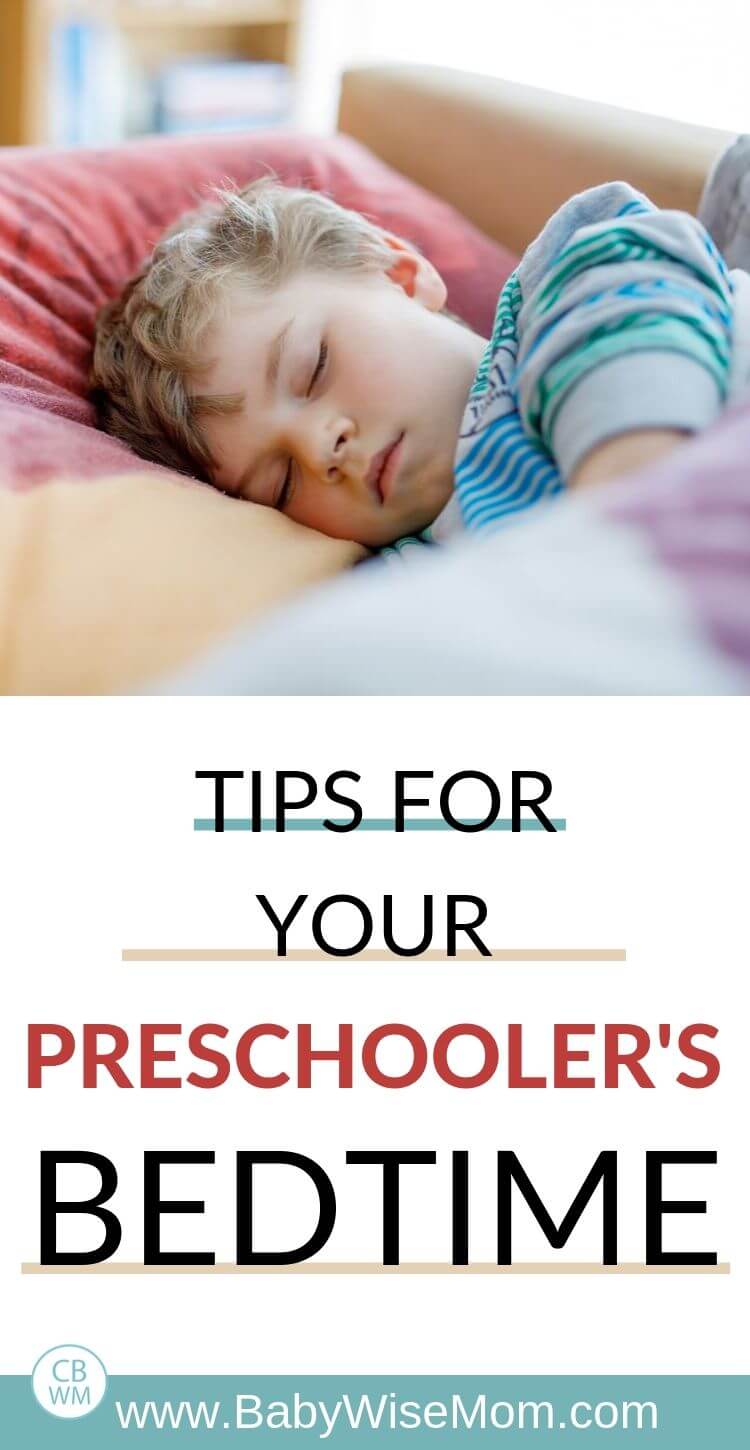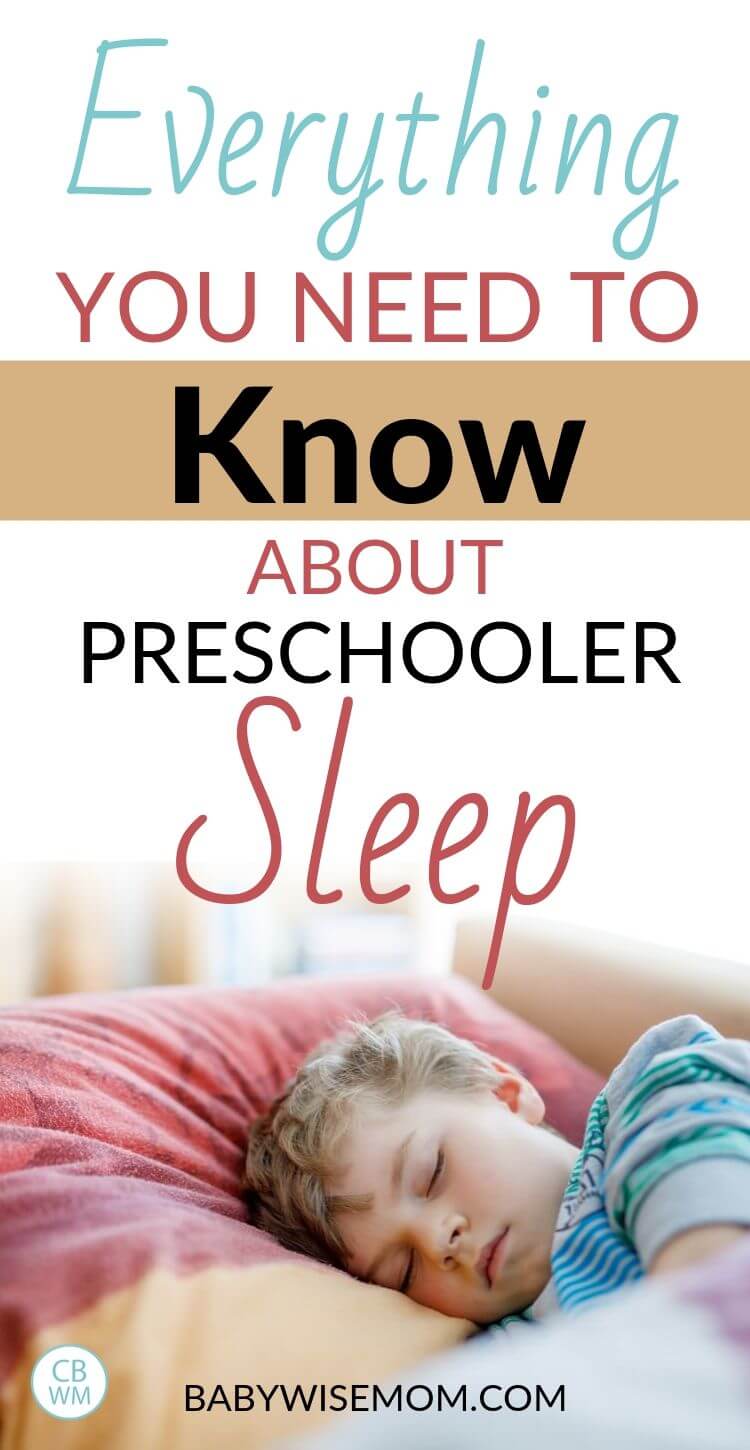Bedtime is vital even for preschoolers. If your little one is disobedient, grumpy, or struggling, you may have a bedtime issue going on.

When you get to the point of having a preschooler, you might not think bedtime is all that important–especially if you have a more flexible child. You may have been careful with bedtime while your child was a baby, but think now that the timing of bedtime is not that important anymore.
This is an incorrect assumption. A consistent bedtime is important at all ages, including adults.
In this post, I give concrete tips and information for bedtime in association with your preschooler. These are tips from On Becoming Preschoolwise.
Post Contents
WHY HAVE AN EARLY BEDTIME?
Here are some reasons an early bedtime is important: (page 104)
An Early Bedtime Helps Your Mood
“When preschool-age children are not getting enough sleep, they are irritable, hard to manage, and have little or no self-control.”
While we were moving when Brayden was 4 and Kaitlyn was 2, Brayden and Kaitlyn were getting to bed late every night. My husband was working on our new house and for two weeks, I was putting all three kids to bed alone each night.
This meant bedtime was late for Brayden and Kaitlyn consistently. I definitely saw a difference in the children’s behavior. At first, I attributed it to them not seeing their dad much and missing him. I am sure that was partially true, but I think most of it was the over-tiredness.
“It is unfair to expect over-tired young children to behave like well-rested ones.”
I know when I am tired, I am far less patient and pleasant. The same is true for children.

Children Grow While They Sleep
Children grow in their sleep. “Around three to four years of age is a time of growth spurts in children.” I can definitely attest to this. From Brayden’s 2nd birthday to his 3rd, he was wearing the same shirts. I found this amazing since he had been changing wardrobes every three months, followed by every six months thus far in his life.
I erroneously assumed between age 3-4, he could do the same. Nope. Not only that, but he went through shirts in a matter of months once again. This is a big time for growth for your child.
Sleep Keeps You Healthy
“Well-rested children do not get sick as often as children who are chronically over-tired.” I think this relates to all people, not just children. When you are running on low sleep, your body is not able to fight off infection as efficiently as when you have plenty of sleep.
Once again, I turn to our moving experience. Typically, my husband and I rarely get sick. We both have strong immune systems. Our children often get colds as children do. During the time we were moving, my husband and I were both operating on a few hours of sleep per night for over two weeks. We both got really sick. Brayden and Kaitlyn got the cold a week later, though not to the same severity of my husband and I. McKenna, who was 5 months old, got a tiny bit of a stuffy nose two weeks later.
My point is this. Typically when a cold comes into our home, Brayden or Kaitlyn get it first. They are the ones around other children the most and the ones who haven’t had as many colds over a lifetime to build immunity to.
McKenna often soon follows.
I will sometimes get a mild form of the cold, though not always. My husband rarely gets the cold.
This time, I got it first with really bad symptoms. My husband soon followed, also really bad. Brayden and Kaitlyn got milder cases, and McKenna’s was basically nothing to speak of.
McKenna was the one getting her consistent sleep. Brayden and Kaitlyn were getting less, though only by an hour each night. My husband and I were getting very little sleep.
“Research shows that lack of sleep increases the risk for obesity, heart disease and infections.” News In Health

WHAT TIME IS BEDTIME?
Now that you understand the importance of sleep, even for a preschooler, you might be wondering what time is best for bedtime.
Take these things into consideration. (page 104)
- Your preschooler needs at least 10 hours of sleep each night. This does not mean bedtime is 10 hours before waketime. Sleep needs to be at least 10 hours.
- Bedtime needs to be 11-11.5 hours before waketime. If your child wakes at 7 AM each day, your child needs to be in bed by 7:30-8:00 PM. This will give your child time to fall asleep. If your preschooler needs 12 hours of sleep, then be sure to start bedtime earlier.
- Don’t start your bedtime routine at what you want to be bedtime. Allow at least 30 minutes for your bedtime routine. Take note of how long your individual routine lasts and leave time for it.
Read: How To Decide What Time Should Be Bedtime
HOW TO CHANGE BEDTIME
If you have looked over these suggestions and recommendations and feel like bedtime needs to be at a different time, you might be wondering how to best to about changing what time bedtime is.
This can be tricky because your child has gotten used to bedtime being at a certain time.
I always like a slow and steady approach. I like to shift schedules slowly and let the body adjust to it. Try moving bedtime back (or up) 15 minutes at a time each week until you reach your desired bedtime. Read up on my tips for shifting your schedule for more help on this.
HOW TO ESTABLISH A CONSISTENT BEDTIME?
If you want to really have a consistent bedtime, follow these tips (pages 105-106):
- Choose a bedtime you can be consistent with. Set yourself up for success.
- If you need to be out late, hire babysitters when possible so you can remain consistent with bedtime.
- Avoid roughhousing before bedtime; it can take children too long to wind down (though I must say, Brayden actually slept better when he got to roughhouse before bed, so always go with what is best for your child).
- Tell your child to go to bed–don’t as if he wants to. You are the parent.
- Help your child get ready for bed. Don’t just send him off to get ready and expect him to do so until he has shown he can. You need to help him through the process of PJs, brushing teeth, bathroom, etc. A preschooler still needs guidance.
- Read stories on the couch or in a chair–not in child’s bed. When Bradyen was two, we did stories in his bed. Storytime took FOREVER! We started doing it on the couch, then went to bed. This made storytime much faster and more consistent in length. You read, then take your child to bed.
- Limit the number of stories. We do three stories per night per child for children reading picture books. If we need to read stories with both Brayden and Kaitlyn together, then we do three total so the time is the same.
- If your child wets the bed, limit drinks after dinner. This can hopefully prevent bed-wetting or bathroom trips after bedtime.
Read: Tips for Finding Your Child’s Ideal Bedtime
CONCLUSION
Sleep is very important for your preschooler. Just because he is older now does not mean that sleep no longer matters. Keep in mind the importance of sleep and also the difference between sleep quality and quantity.
Consistent sleep routines and sleep times lead to better sleep quality. Think of yourself. Think of the difference in your attitude when you get enough sleep and enough quality sleep vs. when you get too little sleep and/or don’t sleep well. Your child is the same. For more on sleep and your preschooler, see On Becoming Preschoolwise starting on page 114.

